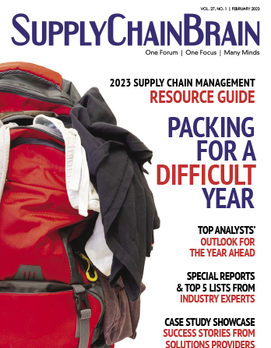
Think Tank
The Road Ahead: Logistics Industry Predictions for 2023

Photo: iStock.com/asbe
Will 2023 herald a return to more “normal” operations in the logistics sector?
With so many factors vulnerable to external events such as fuel prices, accurate predictions can be hard to make. But here’s a closer look at what 2023 might have in store for logistics.
A recession is coming (if it’s not already here). It doesn’t take a crystal ball to make this prediction — economists have been sounding the alarm for months — but the underlying causes may be more enduring than most people realize. The Federal Reserve has been injecting money into the U.S. economy since the 2008 financial crisis, using quantitative easing to buy Treasuries and mortgage-backed securities, and ushering in a period of low interest rates and relative prosperity.
Then COVID-19 hit. More spending propped the economy up and kept families afloat, but now we’re paying the price in the form of higher inflation. The Fed normally has a dual mandate to manage inflation and unemployment, but with near-full employment, it has been raising interest rates to control inflation, which has slowed. Consumers are feeling the pinch, which means less discretionary spending and reduced supply chain volumes. This year will likely be softer for logistics than the last.
The cap on capacity may result in a tighter market under certain conditions. Even with softer demand in 2023, we could see a situation where the market tightens again. That’s because the freight brokerage and transportation management business is subject to the supply and demand dynamics of capacity. There’s been virtually no capacity added; 2018 was the last time trucking companies purchased new tractors on a sizeable scale.
This year would normally be the time trucking companies would replace their aging tractors with newer, more fuel-efficient versions, but supply chain disruptions have made it harder for truck manufacturers to fill orders. So, not only will companies be reluctant to add capacity during a recession, they’ll also find it more difficult to replace existing fleets, which could result in lower overall capacity. And that means any spike in demand or other disruption could cause the market to tighten unexpectedly, despite lower freight volumes.
Technology and automation will continue to advance. Data analytics and technology advances have accelerated over the past decade, with more tech-focused companies assisting legacy firms with modernization projects. The more visionary tech-forward brands have roadmaps in place and will continue to invest in new capabilities and functionalities, because they know they’ll get a return in the form of more efficient transportation execution and better marketplaces for efficient matching of supply and demand, and creation of visibility for shippers.
A softer economy might prompt some companies to hold off on new technology and automation spending, since they anticipate less revenue next year. Others are increasing spending on data science and technology. Company leaders who are confident in the returns those investments will generate will forge ahead in 2023.
Expect consolidations on the asset side — and barriers on the non-asset side. A softer economy and higher interest rates will present challenges. An uncertain economy will make it harder to get financing for deals, and drive down startup valuations.
There are currently many startups operating without a profit, which isn’t unusual in the startup space. But in a logistics environment with declining volume and prices, those companies will find it more difficult to raise funding rounds to accelerate profitability. We’re already seeing startups preserving cash by laying off staff, and if that isn’t enough to get them through the downturn, some may look for merger opportunities to survive.
The primary assumptions driving the logistics industry outlook for 2023 are softer volumes and lower prices, which will make it tough for companies to match or exceed the results of 2022. But one major lesson the past few years have taught the sector is to expect the unexpected. The cap on assets and truck capacity could come into play to raise prices again if there’s a curveball in demand.
Given the economic and geopolitical uncertainty in the world, curveballs can’t be ruled out, but some logistics industry players are bullish on 2023. The road ahead is coming into view, and we’re accelerating toward a brighter future.
Doug Waggoner is chief executive officer of Echo Global Logistics.




